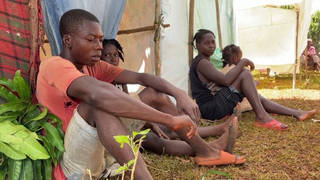
By Amy Goodman with Denis Moynihan
The tragedy of the Haitian earthquake continues to unfold, with slow delivery of aid, the horrific number of amputations performed out of desperate medical necessity, more than a million homeless, perhaps 240,000 dead, hunger, dehydration, the emergence of infections and waterborne diseases, and the approach of the rainy season, which will be followed by the hurricane season. Haiti has suffered a massive blow, an earthquake for which its infrastructure was not prepared, after decades—no, centuries—of military and economic manipulation by foreign governments, most notably the United States and France.
Haiti was a slave plantation controlled by France. In 1804, inspired by Toussaint L’Ouverture (after whom the now barely functioning airport in Port-au-Prince is named), the slaves rebelled, founding the world’s first black republic. Under military threat from France in 1825, Haiti agreed to pay reparations to France for lost “property,” including slaves that French owners lost in the rebellion. It was either agree to pay the reparations or have France invade Haiti and reimpose slavery. Many Haitians believe that original debt, which Haiti dutifully paid through World War II, committed Haiti to a future of poverty that it has never been able to escape. (While France, as part of the deal, recognized Haiti’s sovereignty, slave-owning politicians in the United States, like Thomas Jefferson, refused to recognize the black republic, afraid it would inspire a slave revolt here. The U.S. withheld formal recognition until 1862.)
The U.S. Marines occupied Haiti from 1915 until 1934. In 1956, Francois “Papa Doc” Duvalier took control in a military coup and declared himself president for life, initiating a period of brutal, bloody dictatorship, with U.S. support. Papa Doc died in 1971, at which point his 19-year-old son, Jean-Claude “Baby Doc” Duvalier, took over, maintaining the same violent dictatorial control until he was driven into exile by popular revolt in 1986. Jubilee USA, a network calling for elimination of debt owed by poor countries, estimates that Baby Doc alone diverted at least $500 million in public funds to his private accounts, and that 45 percent of Haiti’s debt in recent decades was accumulated during the corrupt reign of the Duvaliers.
Loans from the World Bank, the International Monetary Fund (IMF) and the Inter-American Development Bank (IDB) imposed “structural adjustment” conditions on Haiti, opening its economy to cheap U.S. agricultural products. Farmers, unable to compete, stopped growing rice and moved to the cities to earn low wages, if they were lucky enough to get one of the scarce sweatshop jobs. People in the highlands were driven to deforest the hills, converting wood into salable charcoal, which created an ecological crisis—destabilizing hillsides, increasing the destructiveness of earthquakes and causing landslides during the rainy season.
Haiti’s first democratically elected president was Jean-Bertrand Aristide, a Catholic priest committed to the poor. He was elected in 1990, then ousted in a military coup in 1991. In 1994, with Haitian refugees flooding into Florida, the Clinton administration was forced to restore Aristide to power, but only with additional structural-adjustment demands. Aristide was re-elected in 2000, only to be deposed again in a U.S.-backed coup in 2004, Haiti’s bicentennial.
The destruction of Haiti’s rice industry, which was replaced with U.S. government-subsidized rice that Haitians refer to as “Miami rice,” as well as the sale of critical state-owned enterprises, like Haiti’s sole flour mill and cement factory, have left the country dependent on foreign trade and aid, keeping Haiti at a permanent disadvantage.
It is critical now to cancel Haiti’s ongoing foreign debt, so that the country can devote its scant resources to rebuilding and not to repaying debt. The G-7 finance ministers met in Canada this week and announced the forgiveness of the bilateral debt between member states and Haiti. But the World Bank, IMF and IDB debts remain (the IMF controversially promised a $100 million loan after the earthquake, eliciting condemnation, and has since pledged to convert it to a grant).
Earthquakes alone do not create disasters of the scale now experienced in Haiti. The wealthy nations have for too long exploited Haiti, denying it the right to develop in a secure, sovereign, sustainable way. The global outpouring of support for Haitians must be matched by long-term, unrestricted grants of aid, and immediate forgiveness of all that country’s debt. Given their role in Haiti’s plight, the United States, France and other industrialized nations should be the ones seeking forgiveness.
Amy Goodman is the host of “Democracy Now!,” an independent, daily global TV/radio news hour airing on more than 950 stations in the United States and around the world. She is the author of “Breaking the Sound Barrier,” recently released in paperback and now a New York Times best-seller.
© 2011 Amy Goodman












Media Options